Leadership, Management, and Operations Analysis: Corus Group plc
VerifiedAdded on 2024/05/15
|21
|3630
|298
Report
AI Summary
This report provides an analysis of leadership and operations management within Corus Group plc, a part of Tata Steel Europe Ltd. It defines and compares the roles of leaders and managers, examining how they apply in different situational contexts. Various leadership theories and models, including situational, systems, and contingency leadership, are explored, along with their strengths and weaknesses. The report also explains key approaches to operations management, such as Total Quality Management (TQM), Just-in-Time (JIT), and Lean Production, and evaluates how leaders and managers can improve operational efficiencies to meet business objectives. Finally, it assesses the factors within the business environment that impact operational management and decision-making, offering a critical evaluation of their application and wider effects.
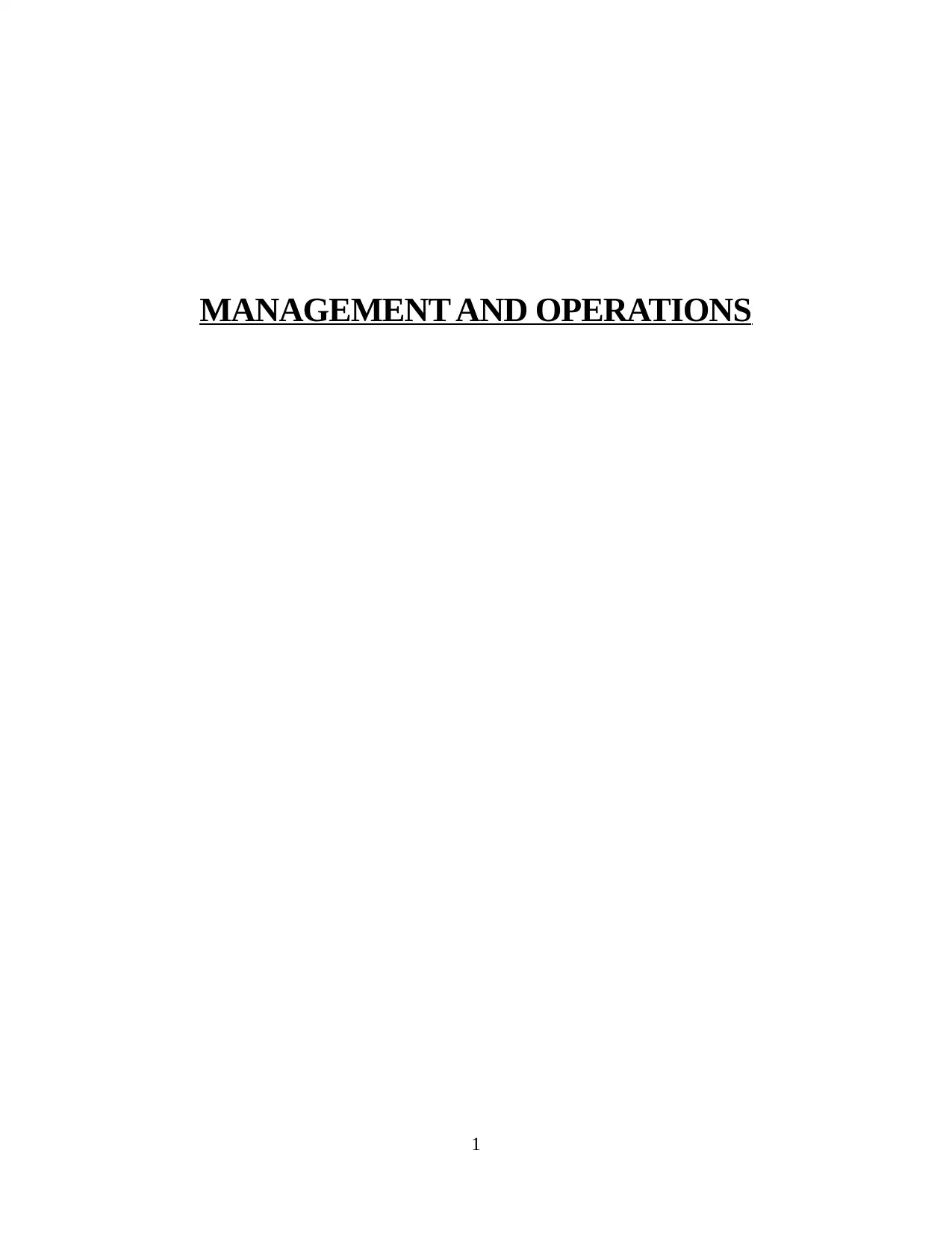
MANAGEMENT AND OPERATIONS
1
1
Paraphrase This Document
Need a fresh take? Get an instant paraphrase of this document with our AI Paraphraser
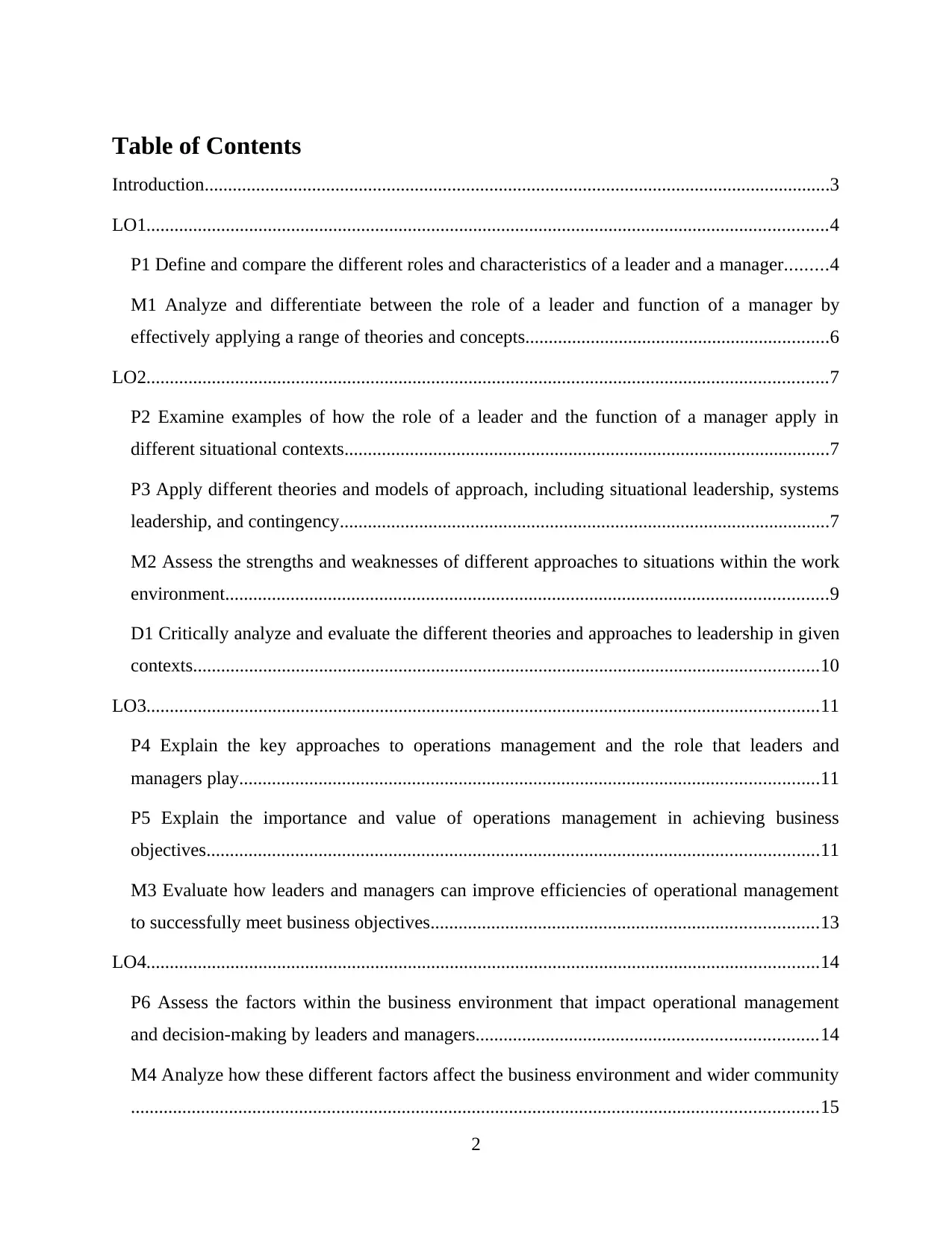
Table of Contents
Introduction......................................................................................................................................3
LO1..................................................................................................................................................4
P1 Define and compare the different roles and characteristics of a leader and a manager.........4
M1 Analyze and differentiate between the role of a leader and function of a manager by
effectively applying a range of theories and concepts.................................................................6
LO2..................................................................................................................................................7
P2 Examine examples of how the role of a leader and the function of a manager apply in
different situational contexts........................................................................................................7
P3 Apply different theories and models of approach, including situational leadership, systems
leadership, and contingency.........................................................................................................7
M2 Assess the strengths and weaknesses of different approaches to situations within the work
environment.................................................................................................................................9
D1 Critically analyze and evaluate the different theories and approaches to leadership in given
contexts......................................................................................................................................10
LO3................................................................................................................................................11
P4 Explain the key approaches to operations management and the role that leaders and
managers play............................................................................................................................11
P5 Explain the importance and value of operations management in achieving business
objectives...................................................................................................................................11
M3 Evaluate how leaders and managers can improve efficiencies of operational management
to successfully meet business objectives...................................................................................13
LO4................................................................................................................................................14
P6 Assess the factors within the business environment that impact operational management
and decision-making by leaders and managers.........................................................................14
M4 Analyze how these different factors affect the business environment and wider community
...................................................................................................................................................15
2
Introduction......................................................................................................................................3
LO1..................................................................................................................................................4
P1 Define and compare the different roles and characteristics of a leader and a manager.........4
M1 Analyze and differentiate between the role of a leader and function of a manager by
effectively applying a range of theories and concepts.................................................................6
LO2..................................................................................................................................................7
P2 Examine examples of how the role of a leader and the function of a manager apply in
different situational contexts........................................................................................................7
P3 Apply different theories and models of approach, including situational leadership, systems
leadership, and contingency.........................................................................................................7
M2 Assess the strengths and weaknesses of different approaches to situations within the work
environment.................................................................................................................................9
D1 Critically analyze and evaluate the different theories and approaches to leadership in given
contexts......................................................................................................................................10
LO3................................................................................................................................................11
P4 Explain the key approaches to operations management and the role that leaders and
managers play............................................................................................................................11
P5 Explain the importance and value of operations management in achieving business
objectives...................................................................................................................................11
M3 Evaluate how leaders and managers can improve efficiencies of operational management
to successfully meet business objectives...................................................................................13
LO4................................................................................................................................................14
P6 Assess the factors within the business environment that impact operational management
and decision-making by leaders and managers.........................................................................14
M4 Analyze how these different factors affect the business environment and wider community
...................................................................................................................................................15
2
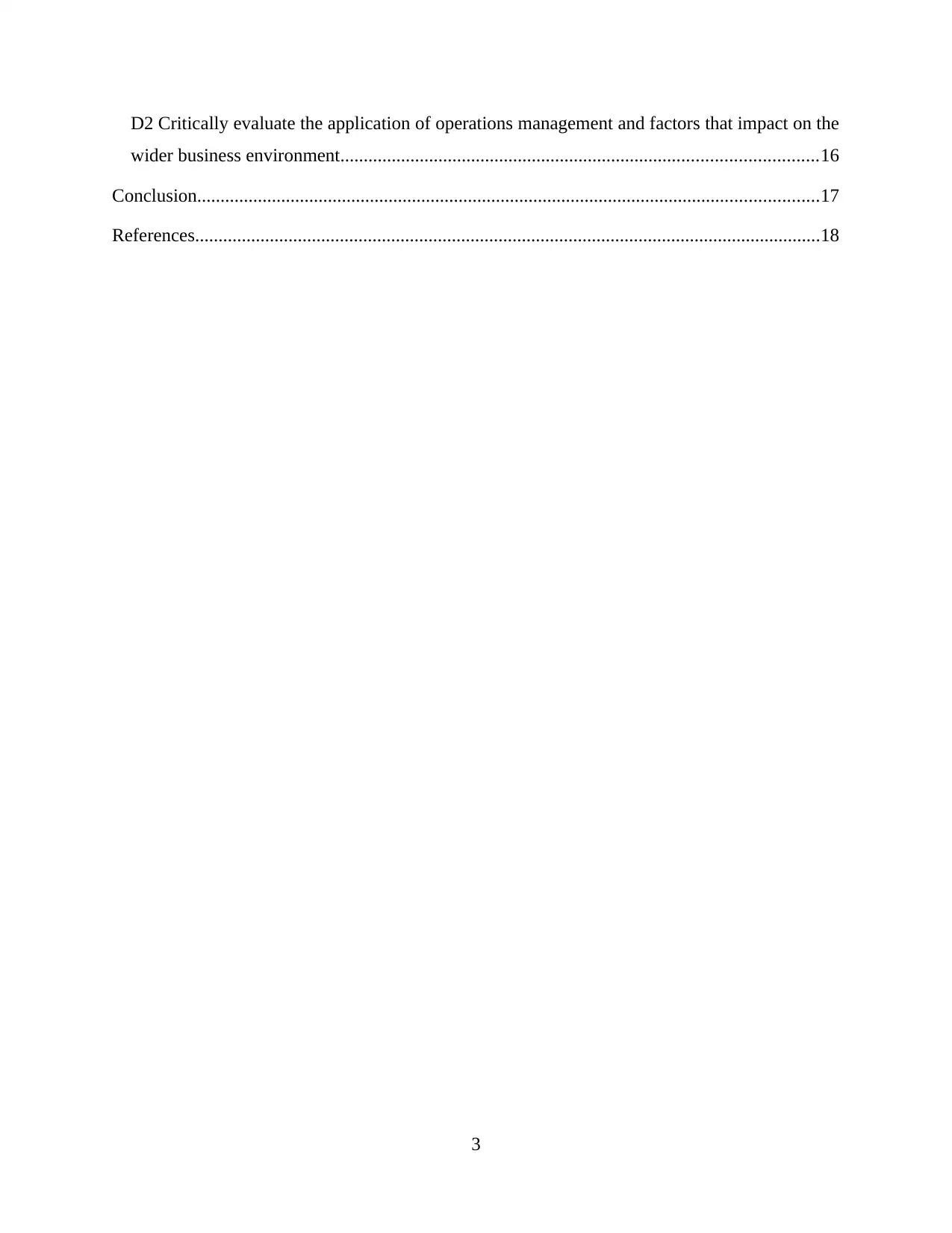
D2 Critically evaluate the application of operations management and factors that impact on the
wider business environment......................................................................................................16
Conclusion.....................................................................................................................................17
References......................................................................................................................................18
3
wider business environment......................................................................................................16
Conclusion.....................................................................................................................................17
References......................................................................................................................................18
3
⊘ This is a preview!⊘
Do you want full access?
Subscribe today to unlock all pages.

Trusted by 1+ million students worldwide
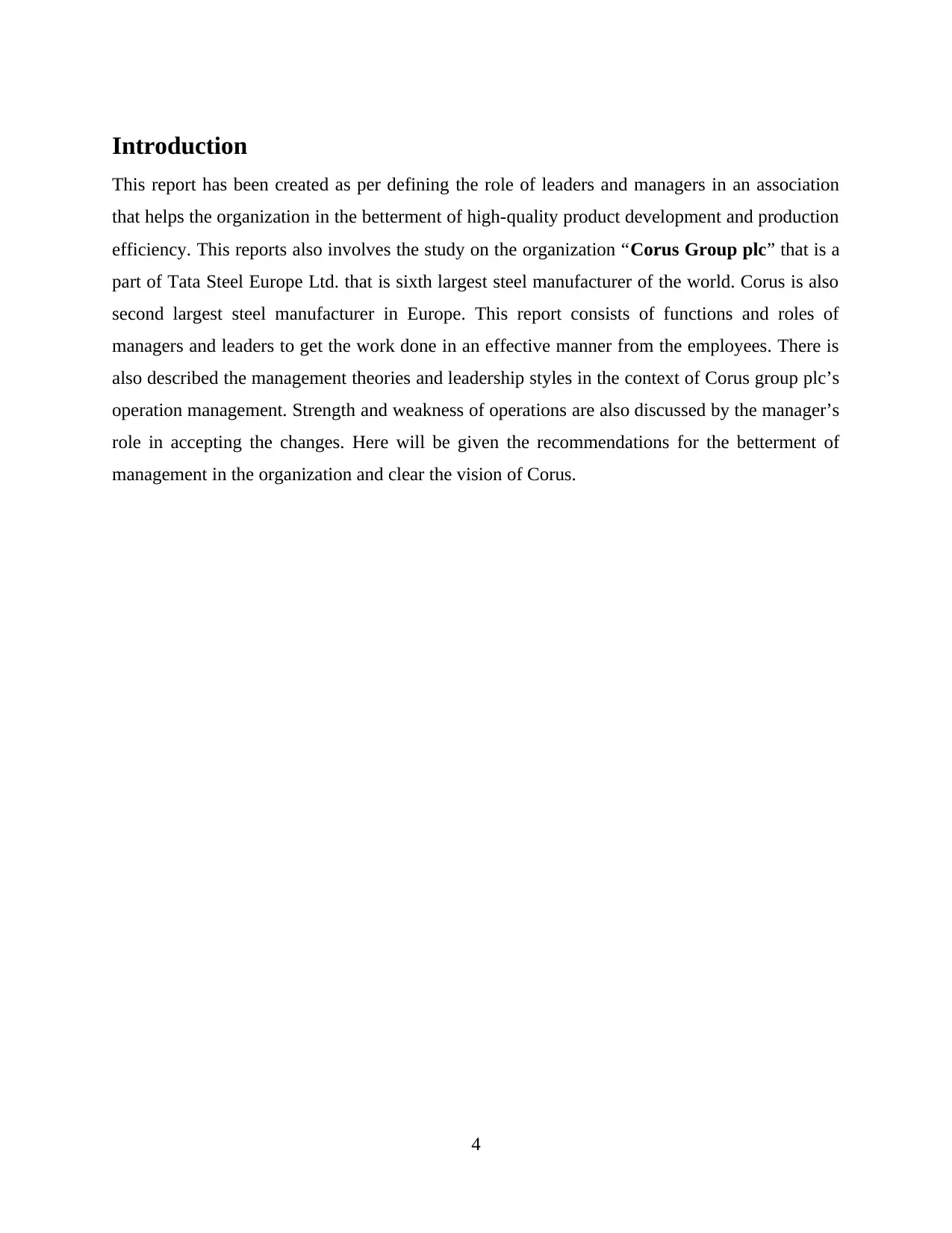
Introduction
This report has been created as per defining the role of leaders and managers in an association
that helps the organization in the betterment of high-quality product development and production
efficiency. This reports also involves the study on the organization “Corus Group plc” that is a
part of Tata Steel Europe Ltd. that is sixth largest steel manufacturer of the world. Corus is also
second largest steel manufacturer in Europe. This report consists of functions and roles of
managers and leaders to get the work done in an effective manner from the employees. There is
also described the management theories and leadership styles in the context of Corus group plc’s
operation management. Strength and weakness of operations are also discussed by the manager’s
role in accepting the changes. Here will be given the recommendations for the betterment of
management in the organization and clear the vision of Corus.
4
This report has been created as per defining the role of leaders and managers in an association
that helps the organization in the betterment of high-quality product development and production
efficiency. This reports also involves the study on the organization “Corus Group plc” that is a
part of Tata Steel Europe Ltd. that is sixth largest steel manufacturer of the world. Corus is also
second largest steel manufacturer in Europe. This report consists of functions and roles of
managers and leaders to get the work done in an effective manner from the employees. There is
also described the management theories and leadership styles in the context of Corus group plc’s
operation management. Strength and weakness of operations are also discussed by the manager’s
role in accepting the changes. Here will be given the recommendations for the betterment of
management in the organization and clear the vision of Corus.
4
Paraphrase This Document
Need a fresh take? Get an instant paraphrase of this document with our AI Paraphraser
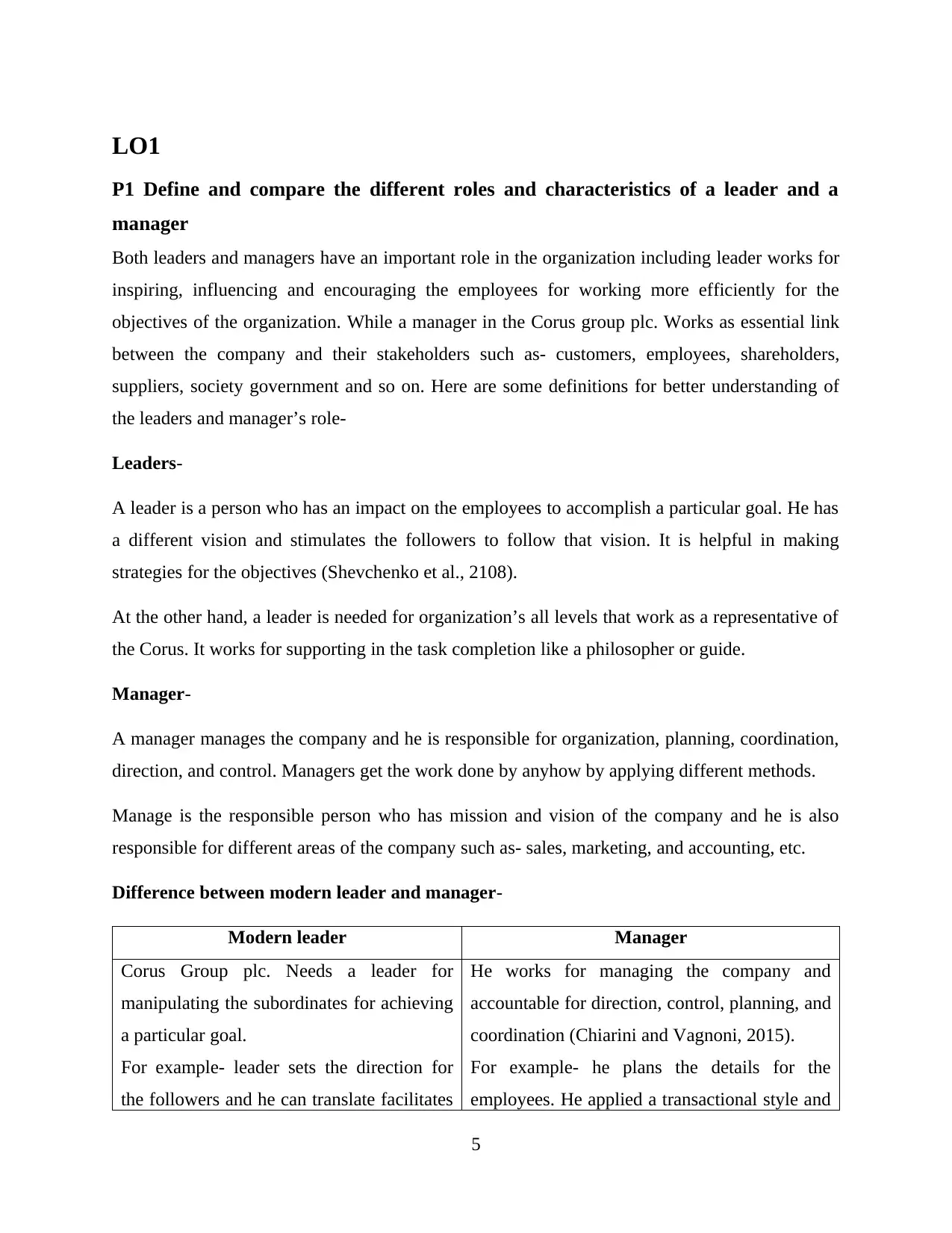
LO1
P1 Define and compare the different roles and characteristics of a leader and a
manager
Both leaders and managers have an important role in the organization including leader works for
inspiring, influencing and encouraging the employees for working more efficiently for the
objectives of the organization. While a manager in the Corus group plc. Works as essential link
between the company and their stakeholders such as- customers, employees, shareholders,
suppliers, society government and so on. Here are some definitions for better understanding of
the leaders and manager’s role-
Leaders-
A leader is a person who has an impact on the employees to accomplish a particular goal. He has
a different vision and stimulates the followers to follow that vision. It is helpful in making
strategies for the objectives (Shevchenko et al., 2108).
At the other hand, a leader is needed for organization’s all levels that work as a representative of
the Corus. It works for supporting in the task completion like a philosopher or guide.
Manager-
A manager manages the company and he is responsible for organization, planning, coordination,
direction, and control. Managers get the work done by anyhow by applying different methods.
Manage is the responsible person who has mission and vision of the company and he is also
responsible for different areas of the company such as- sales, marketing, and accounting, etc.
Difference between modern leader and manager-
Modern leader Manager
Corus Group plc. Needs a leader for
manipulating the subordinates for achieving
a particular goal.
For example- leader sets the direction for
the followers and he can translate facilitates
He works for managing the company and
accountable for direction, control, planning, and
coordination (Chiarini and Vagnoni, 2015).
For example- he plans the details for the
employees. He applied a transactional style and
5
P1 Define and compare the different roles and characteristics of a leader and a
manager
Both leaders and managers have an important role in the organization including leader works for
inspiring, influencing and encouraging the employees for working more efficiently for the
objectives of the organization. While a manager in the Corus group plc. Works as essential link
between the company and their stakeholders such as- customers, employees, shareholders,
suppliers, society government and so on. Here are some definitions for better understanding of
the leaders and manager’s role-
Leaders-
A leader is a person who has an impact on the employees to accomplish a particular goal. He has
a different vision and stimulates the followers to follow that vision. It is helpful in making
strategies for the objectives (Shevchenko et al., 2108).
At the other hand, a leader is needed for organization’s all levels that work as a representative of
the Corus. It works for supporting in the task completion like a philosopher or guide.
Manager-
A manager manages the company and he is responsible for organization, planning, coordination,
direction, and control. Managers get the work done by anyhow by applying different methods.
Manage is the responsible person who has mission and vision of the company and he is also
responsible for different areas of the company such as- sales, marketing, and accounting, etc.
Difference between modern leader and manager-
Modern leader Manager
Corus Group plc. Needs a leader for
manipulating the subordinates for achieving
a particular goal.
For example- leader sets the direction for
the followers and he can translate facilitates
He works for managing the company and
accountable for direction, control, planning, and
coordination (Chiarini and Vagnoni, 2015).
For example- he plans the details for the
employees. He applied a transactional style and
5
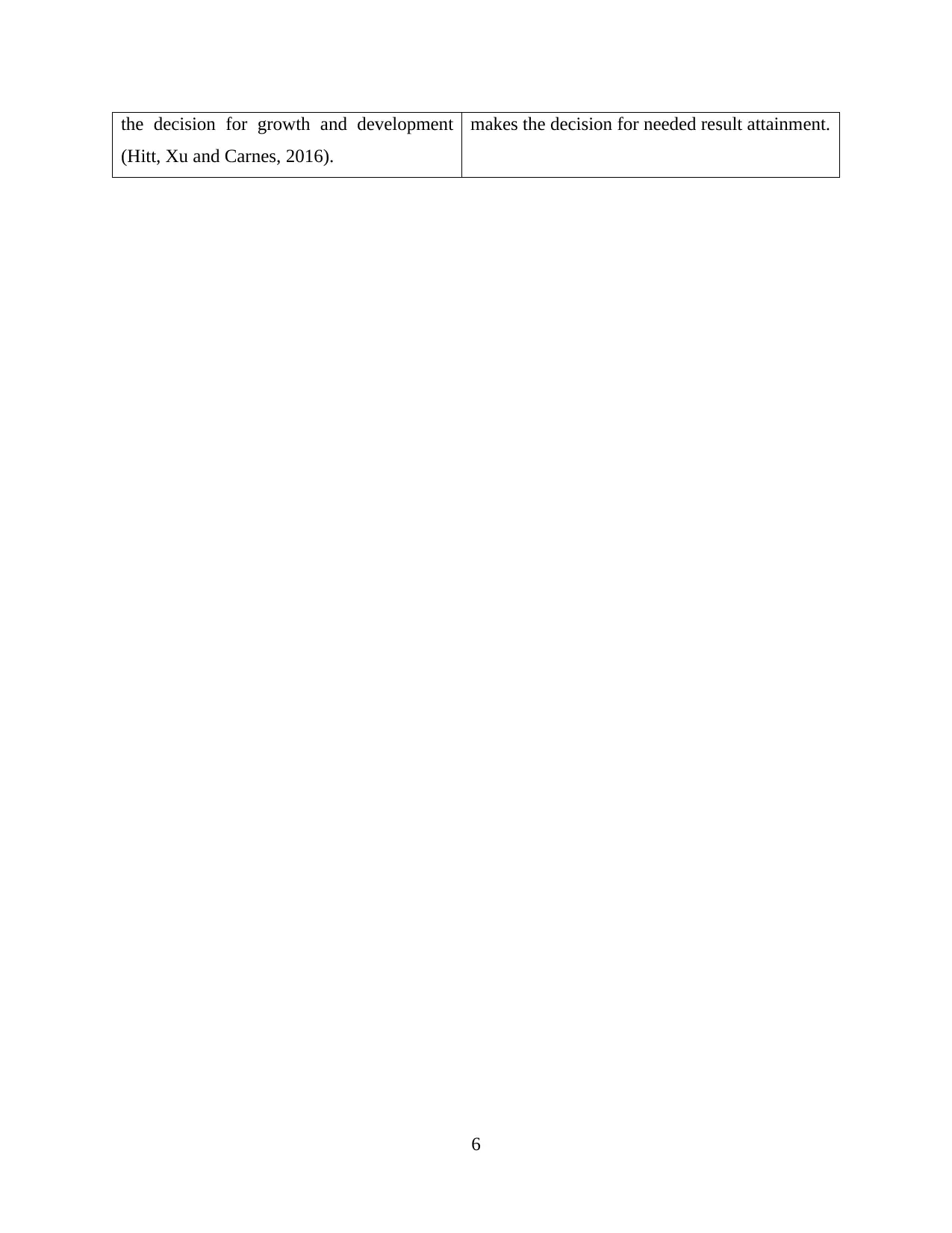
the decision for growth and development
(Hitt, Xu and Carnes, 2016).
makes the decision for needed result attainment.
6
(Hitt, Xu and Carnes, 2016).
makes the decision for needed result attainment.
6
⊘ This is a preview!⊘
Do you want full access?
Subscribe today to unlock all pages.

Trusted by 1+ million students worldwide
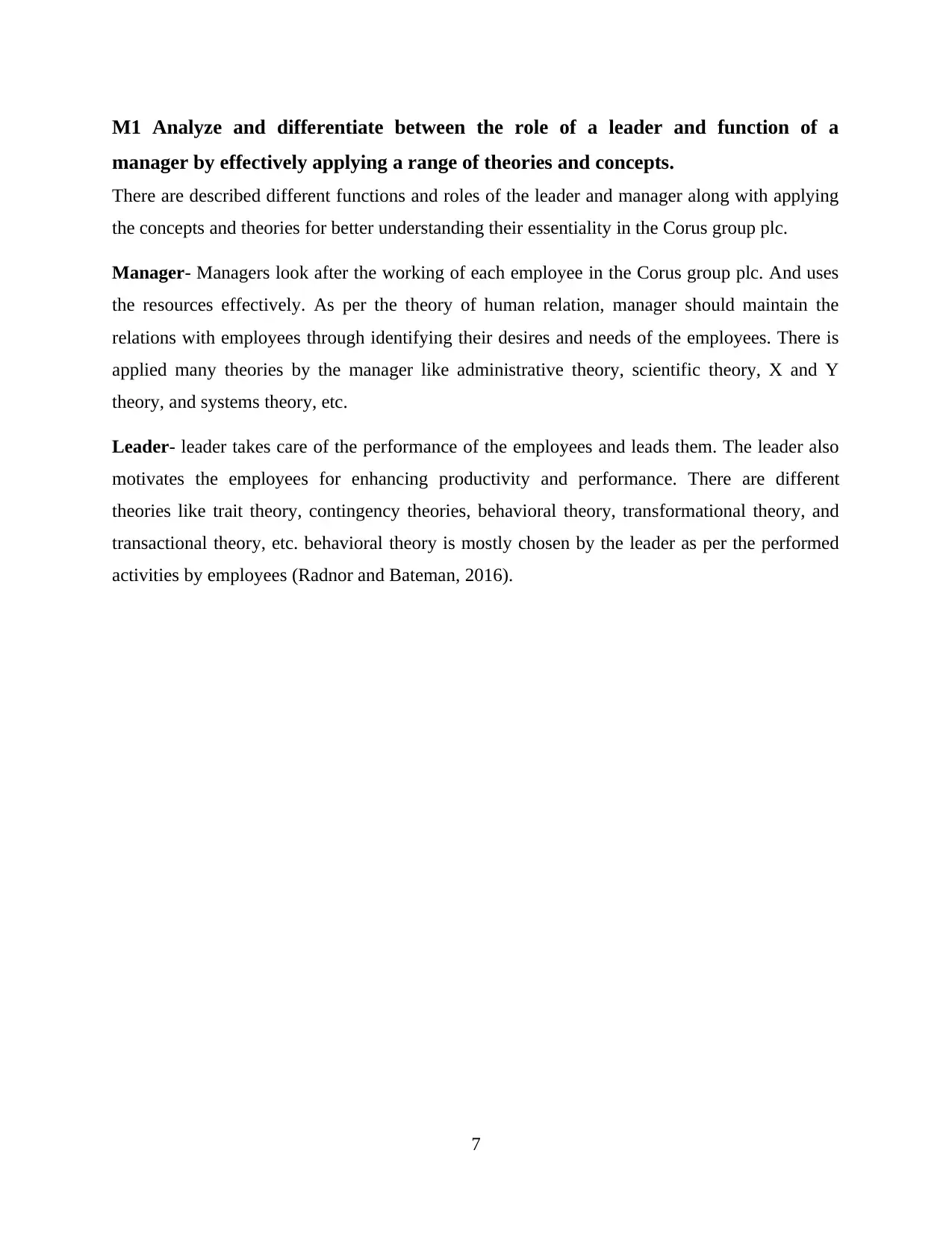
M1 Analyze and differentiate between the role of a leader and function of a
manager by effectively applying a range of theories and concepts.
There are described different functions and roles of the leader and manager along with applying
the concepts and theories for better understanding their essentiality in the Corus group plc.
Manager- Managers look after the working of each employee in the Corus group plc. And uses
the resources effectively. As per the theory of human relation, manager should maintain the
relations with employees through identifying their desires and needs of the employees. There is
applied many theories by the manager like administrative theory, scientific theory, X and Y
theory, and systems theory, etc.
Leader- leader takes care of the performance of the employees and leads them. The leader also
motivates the employees for enhancing productivity and performance. There are different
theories like trait theory, contingency theories, behavioral theory, transformational theory, and
transactional theory, etc. behavioral theory is mostly chosen by the leader as per the performed
activities by employees (Radnor and Bateman, 2016).
7
manager by effectively applying a range of theories and concepts.
There are described different functions and roles of the leader and manager along with applying
the concepts and theories for better understanding their essentiality in the Corus group plc.
Manager- Managers look after the working of each employee in the Corus group plc. And uses
the resources effectively. As per the theory of human relation, manager should maintain the
relations with employees through identifying their desires and needs of the employees. There is
applied many theories by the manager like administrative theory, scientific theory, X and Y
theory, and systems theory, etc.
Leader- leader takes care of the performance of the employees and leads them. The leader also
motivates the employees for enhancing productivity and performance. There are different
theories like trait theory, contingency theories, behavioral theory, transformational theory, and
transactional theory, etc. behavioral theory is mostly chosen by the leader as per the performed
activities by employees (Radnor and Bateman, 2016).
7
Paraphrase This Document
Need a fresh take? Get an instant paraphrase of this document with our AI Paraphraser
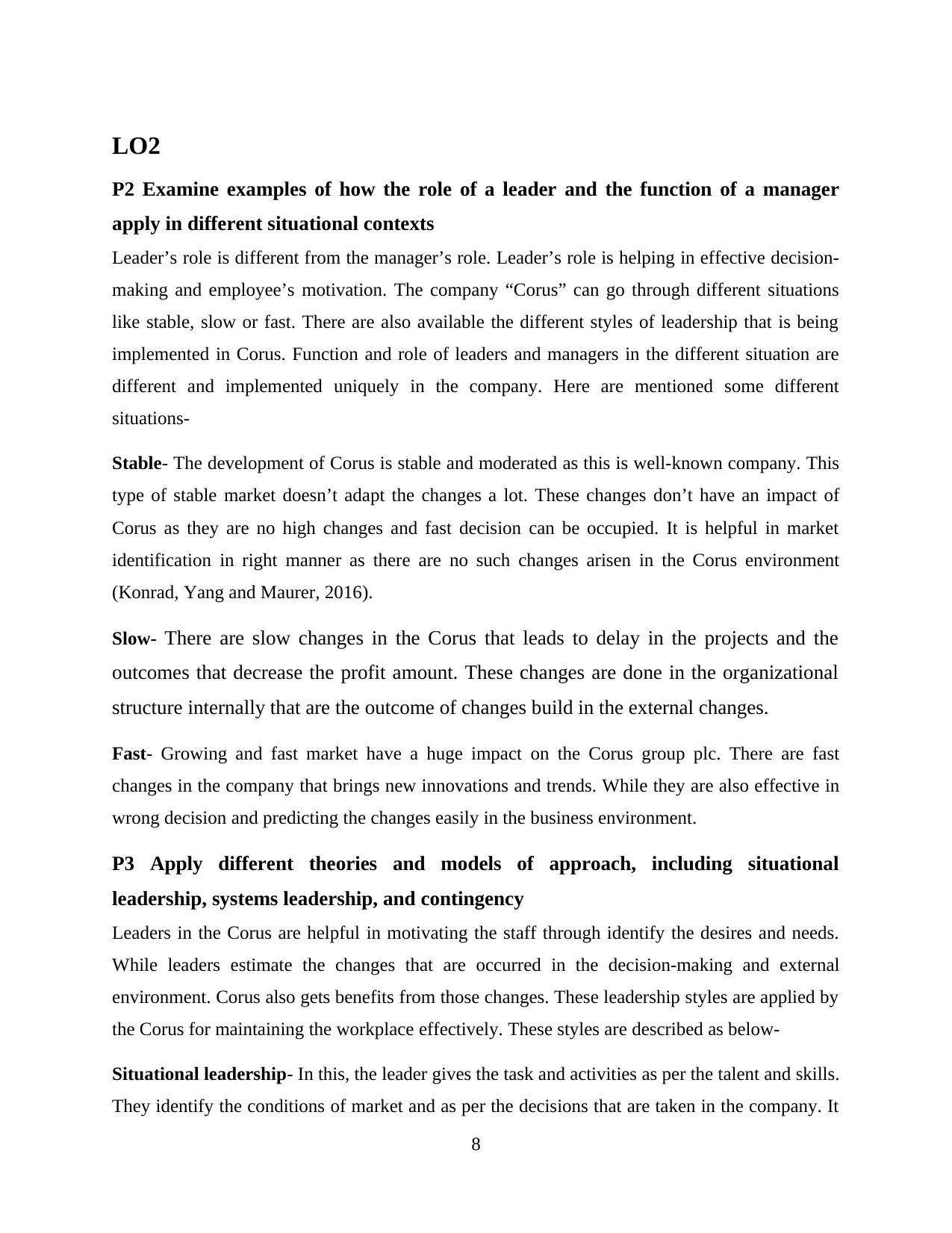
LO2
P2 Examine examples of how the role of a leader and the function of a manager
apply in different situational contexts
Leader’s role is different from the manager’s role. Leader’s role is helping in effective decision-
making and employee’s motivation. The company “Corus” can go through different situations
like stable, slow or fast. There are also available the different styles of leadership that is being
implemented in Corus. Function and role of leaders and managers in the different situation are
different and implemented uniquely in the company. Here are mentioned some different
situations-
Stable- The development of Corus is stable and moderated as this is well-known company. This
type of stable market doesn’t adapt the changes a lot. These changes don’t have an impact of
Corus as they are no high changes and fast decision can be occupied. It is helpful in market
identification in right manner as there are no such changes arisen in the Corus environment
(Konrad, Yang and Maurer, 2016).
Slow- There are slow changes in the Corus that leads to delay in the projects and the
outcomes that decrease the profit amount. These changes are done in the organizational
structure internally that are the outcome of changes build in the external changes.
Fast- Growing and fast market have a huge impact on the Corus group plc. There are fast
changes in the company that brings new innovations and trends. While they are also effective in
wrong decision and predicting the changes easily in the business environment.
P3 Apply different theories and models of approach, including situational
leadership, systems leadership, and contingency
Leaders in the Corus are helpful in motivating the staff through identify the desires and needs.
While leaders estimate the changes that are occurred in the decision-making and external
environment. Corus also gets benefits from those changes. These leadership styles are applied by
the Corus for maintaining the workplace effectively. These styles are described as below-
Situational leadership- In this, the leader gives the task and activities as per the talent and skills.
They identify the conditions of market and as per the decisions that are taken in the company. It
8
P2 Examine examples of how the role of a leader and the function of a manager
apply in different situational contexts
Leader’s role is different from the manager’s role. Leader’s role is helping in effective decision-
making and employee’s motivation. The company “Corus” can go through different situations
like stable, slow or fast. There are also available the different styles of leadership that is being
implemented in Corus. Function and role of leaders and managers in the different situation are
different and implemented uniquely in the company. Here are mentioned some different
situations-
Stable- The development of Corus is stable and moderated as this is well-known company. This
type of stable market doesn’t adapt the changes a lot. These changes don’t have an impact of
Corus as they are no high changes and fast decision can be occupied. It is helpful in market
identification in right manner as there are no such changes arisen in the Corus environment
(Konrad, Yang and Maurer, 2016).
Slow- There are slow changes in the Corus that leads to delay in the projects and the
outcomes that decrease the profit amount. These changes are done in the organizational
structure internally that are the outcome of changes build in the external changes.
Fast- Growing and fast market have a huge impact on the Corus group plc. There are fast
changes in the company that brings new innovations and trends. While they are also effective in
wrong decision and predicting the changes easily in the business environment.
P3 Apply different theories and models of approach, including situational
leadership, systems leadership, and contingency
Leaders in the Corus are helpful in motivating the staff through identify the desires and needs.
While leaders estimate the changes that are occurred in the decision-making and external
environment. Corus also gets benefits from those changes. These leadership styles are applied by
the Corus for maintaining the workplace effectively. These styles are described as below-
Situational leadership- In this, the leader gives the task and activities as per the talent and skills.
They identify the conditions of market and as per the decisions that are taken in the company. It
8
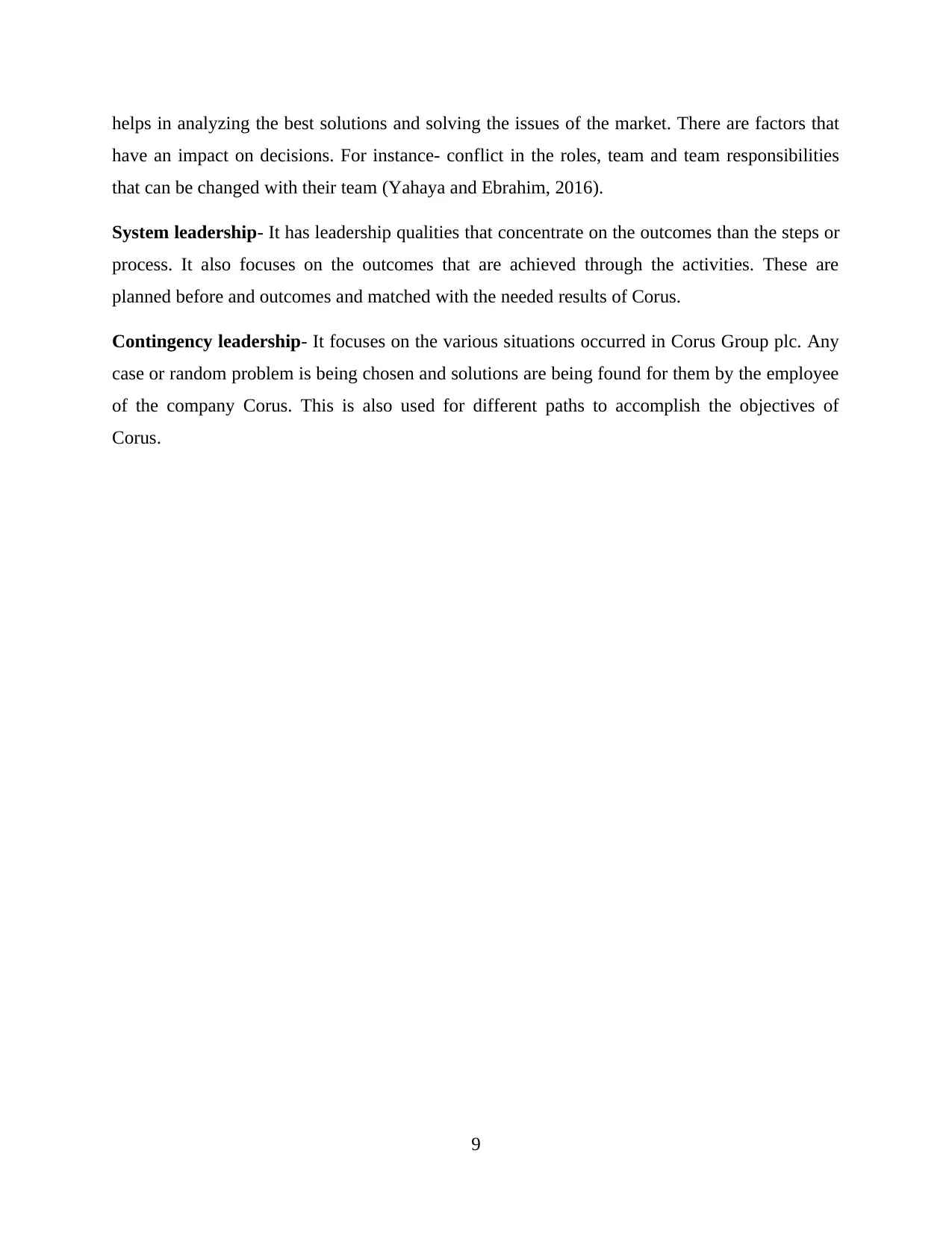
helps in analyzing the best solutions and solving the issues of the market. There are factors that
have an impact on decisions. For instance- conflict in the roles, team and team responsibilities
that can be changed with their team (Yahaya and Ebrahim, 2016).
System leadership- It has leadership qualities that concentrate on the outcomes than the steps or
process. It also focuses on the outcomes that are achieved through the activities. These are
planned before and outcomes and matched with the needed results of Corus.
Contingency leadership- It focuses on the various situations occurred in Corus Group plc. Any
case or random problem is being chosen and solutions are being found for them by the employee
of the company Corus. This is also used for different paths to accomplish the objectives of
Corus.
9
have an impact on decisions. For instance- conflict in the roles, team and team responsibilities
that can be changed with their team (Yahaya and Ebrahim, 2016).
System leadership- It has leadership qualities that concentrate on the outcomes than the steps or
process. It also focuses on the outcomes that are achieved through the activities. These are
planned before and outcomes and matched with the needed results of Corus.
Contingency leadership- It focuses on the various situations occurred in Corus Group plc. Any
case or random problem is being chosen and solutions are being found for them by the employee
of the company Corus. This is also used for different paths to accomplish the objectives of
Corus.
9
⊘ This is a preview!⊘
Do you want full access?
Subscribe today to unlock all pages.

Trusted by 1+ million students worldwide
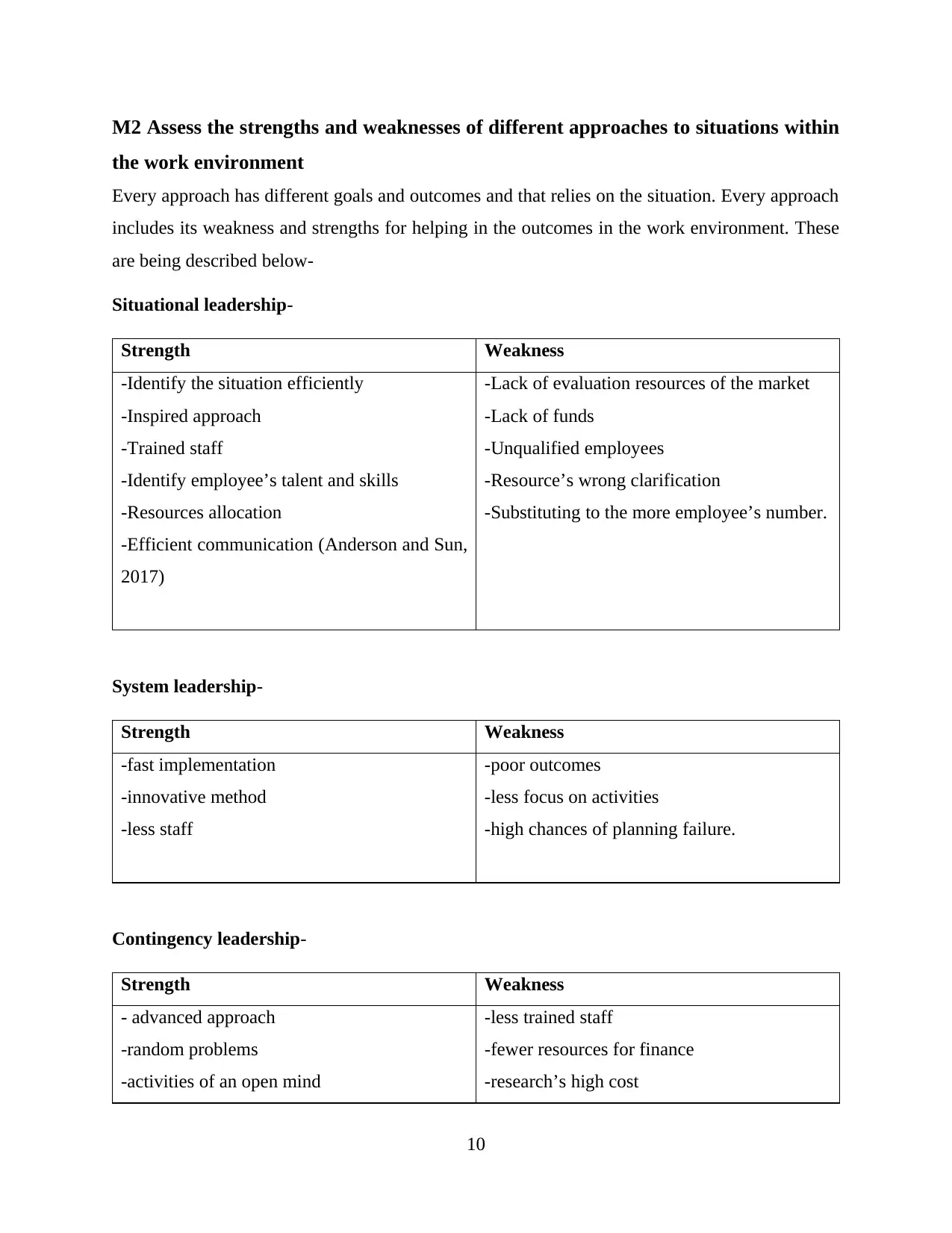
M2 Assess the strengths and weaknesses of different approaches to situations within
the work environment
Every approach has different goals and outcomes and that relies on the situation. Every approach
includes its weakness and strengths for helping in the outcomes in the work environment. These
are being described below-
Situational leadership-
Strength Weakness
-Identify the situation efficiently
-Inspired approach
-Trained staff
-Identify employee’s talent and skills
-Resources allocation
-Efficient communication (Anderson and Sun,
2017)
-Lack of evaluation resources of the market
-Lack of funds
-Unqualified employees
-Resource’s wrong clarification
-Substituting to the more employee’s number.
System leadership-
Strength Weakness
-fast implementation
-innovative method
-less staff
-poor outcomes
-less focus on activities
-high chances of planning failure.
Contingency leadership-
Strength Weakness
- advanced approach
-random problems
-activities of an open mind
-less trained staff
-fewer resources for finance
-research’s high cost
10
the work environment
Every approach has different goals and outcomes and that relies on the situation. Every approach
includes its weakness and strengths for helping in the outcomes in the work environment. These
are being described below-
Situational leadership-
Strength Weakness
-Identify the situation efficiently
-Inspired approach
-Trained staff
-Identify employee’s talent and skills
-Resources allocation
-Efficient communication (Anderson and Sun,
2017)
-Lack of evaluation resources of the market
-Lack of funds
-Unqualified employees
-Resource’s wrong clarification
-Substituting to the more employee’s number.
System leadership-
Strength Weakness
-fast implementation
-innovative method
-less staff
-poor outcomes
-less focus on activities
-high chances of planning failure.
Contingency leadership-
Strength Weakness
- advanced approach
-random problems
-activities of an open mind
-less trained staff
-fewer resources for finance
-research’s high cost
10
Paraphrase This Document
Need a fresh take? Get an instant paraphrase of this document with our AI Paraphraser
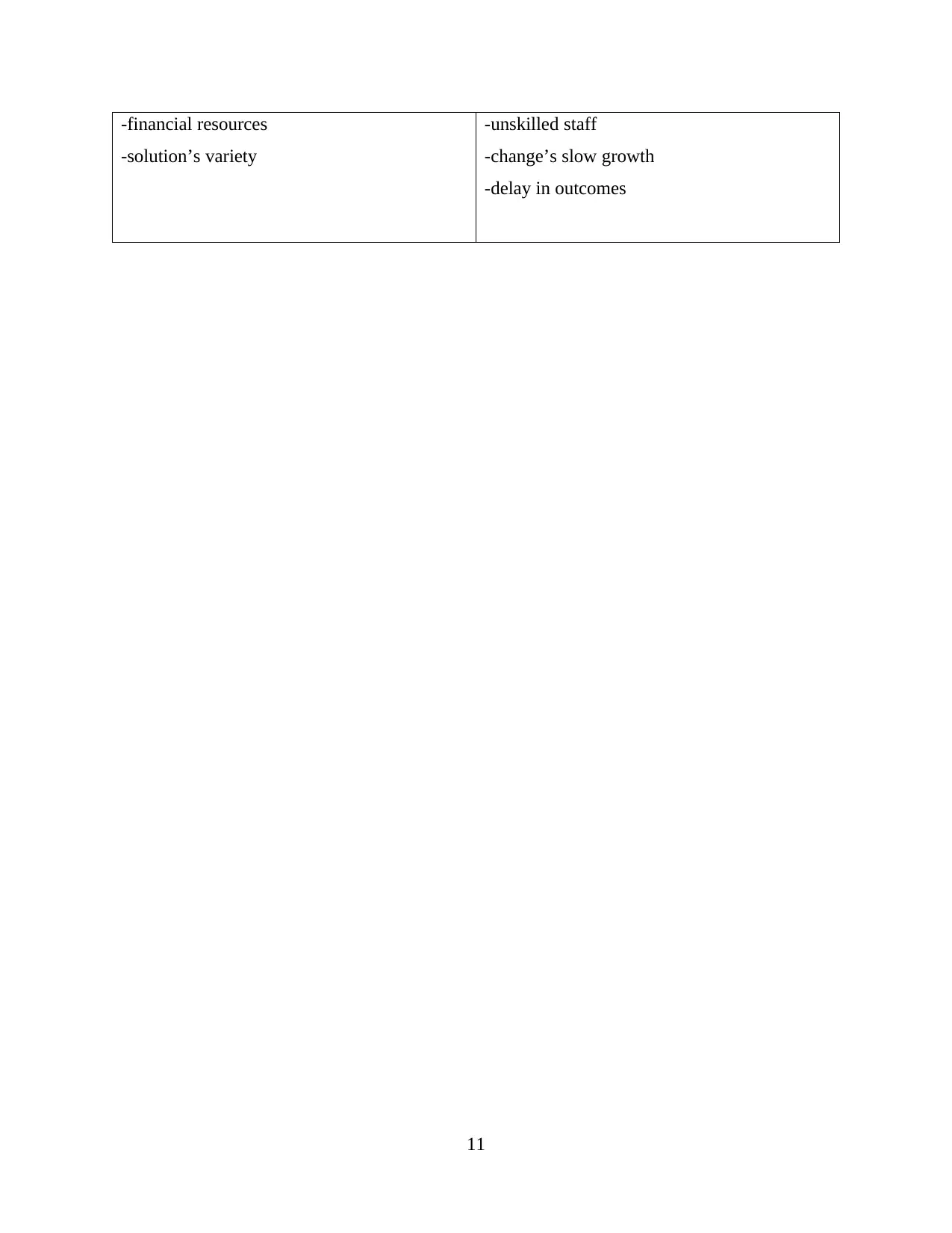
-financial resources
-solution’s variety
-unskilled staff
-change’s slow growth
-delay in outcomes
11
-solution’s variety
-unskilled staff
-change’s slow growth
-delay in outcomes
11
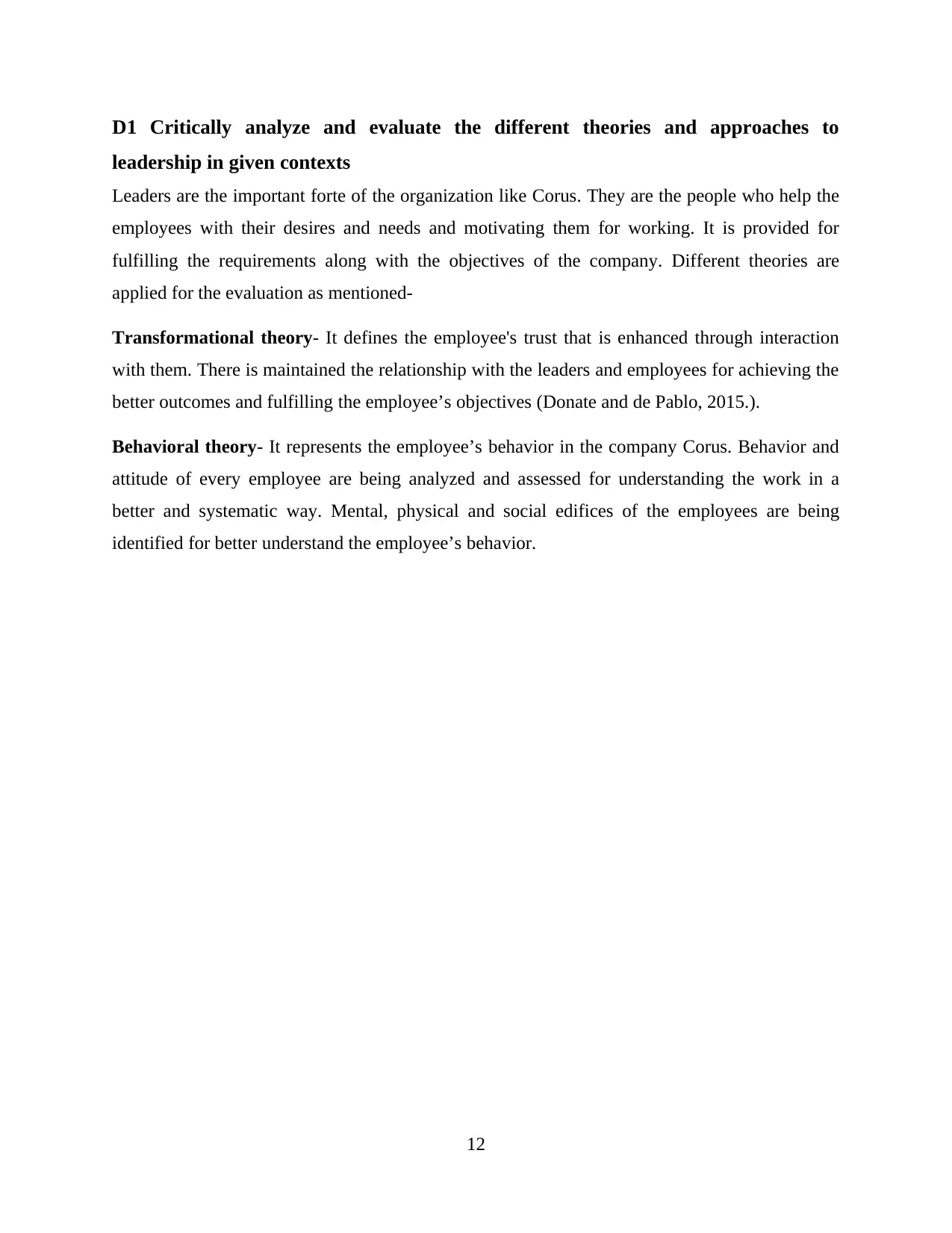
D1 Critically analyze and evaluate the different theories and approaches to
leadership in given contexts
Leaders are the important forte of the organization like Corus. They are the people who help the
employees with their desires and needs and motivating them for working. It is provided for
fulfilling the requirements along with the objectives of the company. Different theories are
applied for the evaluation as mentioned-
Transformational theory- It defines the employee's trust that is enhanced through interaction
with them. There is maintained the relationship with the leaders and employees for achieving the
better outcomes and fulfilling the employee’s objectives (Donate and de Pablo, 2015.).
Behavioral theory- It represents the employee’s behavior in the company Corus. Behavior and
attitude of every employee are being analyzed and assessed for understanding the work in a
better and systematic way. Mental, physical and social edifices of the employees are being
identified for better understand the employee’s behavior.
12
leadership in given contexts
Leaders are the important forte of the organization like Corus. They are the people who help the
employees with their desires and needs and motivating them for working. It is provided for
fulfilling the requirements along with the objectives of the company. Different theories are
applied for the evaluation as mentioned-
Transformational theory- It defines the employee's trust that is enhanced through interaction
with them. There is maintained the relationship with the leaders and employees for achieving the
better outcomes and fulfilling the employee’s objectives (Donate and de Pablo, 2015.).
Behavioral theory- It represents the employee’s behavior in the company Corus. Behavior and
attitude of every employee are being analyzed and assessed for understanding the work in a
better and systematic way. Mental, physical and social edifices of the employees are being
identified for better understand the employee’s behavior.
12
⊘ This is a preview!⊘
Do you want full access?
Subscribe today to unlock all pages.

Trusted by 1+ million students worldwide
1 out of 21
Related Documents
Your All-in-One AI-Powered Toolkit for Academic Success.
+13062052269
info@desklib.com
Available 24*7 on WhatsApp / Email
![[object Object]](/_next/static/media/star-bottom.7253800d.svg)
Unlock your academic potential
Copyright © 2020–2026 A2Z Services. All Rights Reserved. Developed and managed by ZUCOL.




